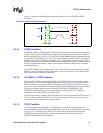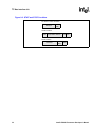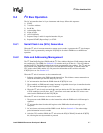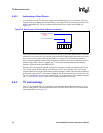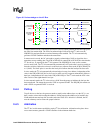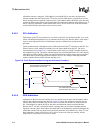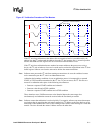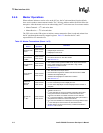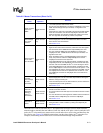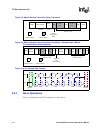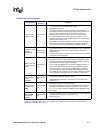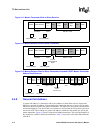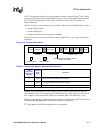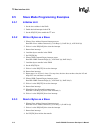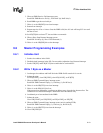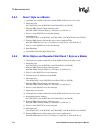
Intel® PXA255 Processor Developer’s Manual 9-13
I
2
C Bus Interface Unit
When the CPU needs to read data, the I
2
C unit transitions from slave-receive mode to master-
transmit mode to transmit the start address, R/nW bit, and the ACK pulse. After it sends the ACK
pulse, the I
2
C unit transitions to master-receive mode and waits to receive the read data from the
slave device (see Figure 9-8).Multiple transactions can take place during an I
2
C operation. For
example, transitioning from master-receive to master-transmit through a repeated start.
Write one data
byte to the
IDBR
Master-transmit
only
•I
2
C master operation data transmit mode.
• Occurs when the ISR[ITE] bit is set and the ICR[TB] bit is clear. If the
IDBR Transmit Empty Interrupt is enabled, it is signalled to the
processor.
• CPU writes one data byte to the IDBR, sets the appropriate START/
STOP bit combination, and sets the ICR[TB] bit to send the data.
Eight bits are taken from the shift register and written to the serial
bus. The eight bits are followed by a STOP, if requested.
Wait for
Acknowledge
from slave-
receiver
Master-transmit
only
• As a master-transmitter, the I
2
C unit generates the clock for the
acknowledge pulse. The I
2
C unit releases the SDA line to allow
slave-receiver ACK transmission.
•See Section 9.4.3.
Read one byte
of I
2
C Data
from the IDBR
Master-receive
only
•I
2
C master operation data receive mode.
• Eight bits are read from the serial bus, collected in the shift register
then transferred to the IDBR after the ICR[ACKNAK] bit is read.
• The CPU reads the IDBR when the ISR[IRF] bit is set and the
ICR[TB] bit is clear. If IDBR Receive Full Interrupt is enabled, it is
signalled to the CPU.
• When the IDBR is read, if the ISR[ACKNAK] is clear (indicating
ACK), the processor writes the ICR[ACKNAK] bit and set the
ICR[TB] bit to initiate the next byte read.
• If the ISR[ACKNAK] bit is set (indicating NAK), ICR[TB] bit is clear,
ICR[STOP] bit is set, and ISR[UB] bit is set, then the last data byte
has been read into the IDBR and the I
2
C unit is sending the STOP.
• If the ISR[ACKNAK] bit is set (indicating NAK), ICR[TB] bit is clear,
but the ICR[STOP] bit is clear, then the CPU has two options: 1. set
the ICR[START] bit, write a new target address to the IDBR, and set
the ICR[TB] bit which will send a repeated start condition or 2. set
the ICR[MA] bit and leave the ICR[TB] bit clear which will send a
STOP only.
Transmit
Acknowledge
to slave-
transmitter
Master-receive
only
• As a master-receiver, the I
2
C unit will generate the clock for the
acknowledge pulse. The I
2
C unit is also responsible for driving the
SDA line during the ACK cycle.
• If the next data byte is to be the last transaction, the CPU will set the
ICR[ACKNAK] bit for NAK generation.
•See Section 9.4.3.
Generate a
Repeated
START to
chain I
2
C
transactions
Master-transmit
Master-receive
• If data chaining is desired, a repeated START condition is used
instead of a STOP condition.
• This occurs after the last data byte of a transaction has been written
to the bus.
• The CPU will write the next target slave address and the R/nW bit to
the IDBR, set the ICR[START] bit, and set the ICR[TB] bit.
•See Section 9.3.3.
Generate a
STOP
Master-transmit
Master-receive
• Generated after the CPU writes the last data byte on the bus.
•CPU
generates a STOP condition by setting the ICR[STOP] bit.
•See Section 9.3.3.
Table 9-5. Master Transactions (Sheet 2 of 2)
I
2
C Master
Action
Mode of
Operation
Definition



